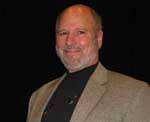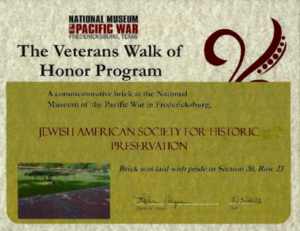By Jerry Klinger

“The Citizens of the United States of America have a right to applaud themselves for having given to mankind examples of an enlarged and liberal policy: a policy worthy of imitation. All possess alike liberty of conscience and immunities of citizenship. It is now no more that toleration is spoken of, as if it was by the indulgence of one class of people that another enjoyed the exercise of their inherent natural rights. For happily the Government of the United States, which gives to bigotry no sanction, to persecution no assistance requires only that they who live under its protection should demean themselves as good citizens, in giving it on all occasions their effectual support.”
These were the words of George Washington to the Hebrew Congregation in Newport, Rhode Island, August 18, 1790.
We live in an American world where our opinions and memory are shaped by 10-second soundbites of cynical history slavered through mass or social media. What we see, hear, and learn is selectively spoon-fed reflecting their political agendas.
Remembering the past to shape the future is considered out of step, even dangerous to some. American history and civics are optional courses, not required learning.
Most of us know a fragment of what Washington said, something about the U.S. government gives no sanction to bigotry and persecution.
We know that ideals and reality do not always reflect each other.
What is never shared, or taught in the soundbite of wisdom, is that freedom is a process the American Revolutionary experience created for us at a price they paid. It was never intended to be a finished product.
Every American generation struggled with new and different challenges and tests. Sometimes they failed. Over the long term, the dynamics of the ideals, the dreams, paid for in the blood of patriots, as Thomas Jefferson posited, moved us to a better place.
The Preamble to the Constitution, itself a document born of strife and compromise, took form deep in common law before the Constitution was written. The key eight words that were incorporated in the opening line shaped the future, “in order to form a more perfect Union.”
Memorial Day was created after the bloodiest war in American history, the American Civil War, between opposing views of the American union.
A total of 650,000 Americans, north and south, paid their price in blood when the political process of Constitutional change failed. General John Logan, a Union Veteran, on May 30, 1868, organized a national commemoration of memory for those who had paid the ultimate price.
Over time, the process of honored memory extended to all parts of the country as our common story and processes evolved, from the Civil War to Afghanistan.
Jews had been part of the story since the Voyages of Discovery with Columbus. At times the Jewish commonality, contribution, and sacrifice for America was deliberately concealed, and other times, proclaimed. Jews fought and served in every American conflict with distinctions disproportionate to their representation in the population.
Below the surface, even in America, a world, worlds apart from the oppression Jews had experienced in the non-Jewish world, the fear and reality of antisemitism played with Jewish minds.
Ironically, it was done by Jews to themselves, insecure from their multiple millennia perspective of toleration followed by intolerance.
For Jews to believe meant for some Jews to assimilate. For other Jews safety, and security was to remain distinct and apart. While for yet others it meant, “Proclaim liberty throughout all the land unto all the inhabitants thereof!” (Leviticus 25:10)
The common denominator was the freedom to choose, the freedom to be what they wished, even when at times they faced ugly adversity. It was a choice given to Jews and all Americans alike by those who sleep in the hollowed soil of American sacrifice.
Freedom and the future were not given to guaranteed but was given with the right to struggle for a more perfect union. Those who sleep paid for our right with their blood.
On Memorial Day, we remember them. On Memorial Day we honor them.
 The Jewish American Society for Historic Preservation has chosen to remember, to honor and to proclaim, to even those that hate Jews. We thank everyone, Americans of many faiths, walks of life, cultures, non-Jews, and Jews alike for the blessing and the opportunities of freedom they have given us.
The Jewish American Society for Historic Preservation has chosen to remember, to honor and to proclaim, to even those that hate Jews. We thank everyone, Americans of many faiths, walks of life, cultures, non-Jews, and Jews alike for the blessing and the opportunities of freedom they have given us.
As a modest, even humble gesture of memory and respect, JASHP places bricks and pavers at places of American honor, military museums, memorials, and more.
JASHP has placed memorials, simply worded, Jewish American Society for Historic Preservation, ranging from the Civil War Museum, the World War I Museum, the U.S. Air Force Museum to recently the National Museum of the Pacific War (the Nimitz Museum) and many more.
Some will see the memorials and say, I did not know that about Jews. Others will see them and say, Jews…? And all will have to acknowledge we are all one.
A family barbeque may be the method of memory on Memorial Day for lots of us. Remember for a moment who gave us the privilege.
Postscript:
Remembering Cpl. Nathan Bayden — Ossining, N.Y., KIA Dec.7, 1943, Algeria, on a volunteer mission bringing ammunition to the front lines.
*
Jerry Klinger is the President of the Jewish American Society for Historic Preservation, www.JASHP.org